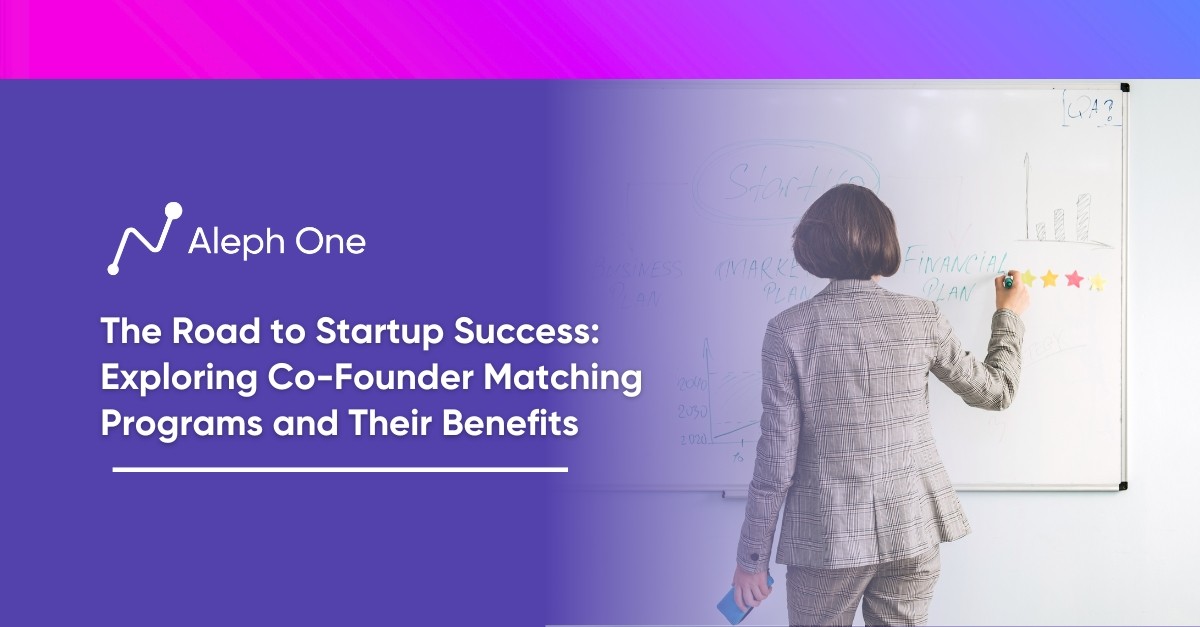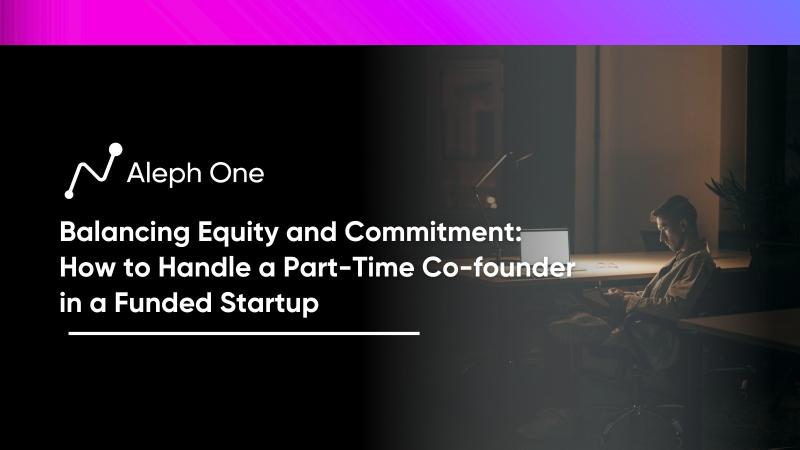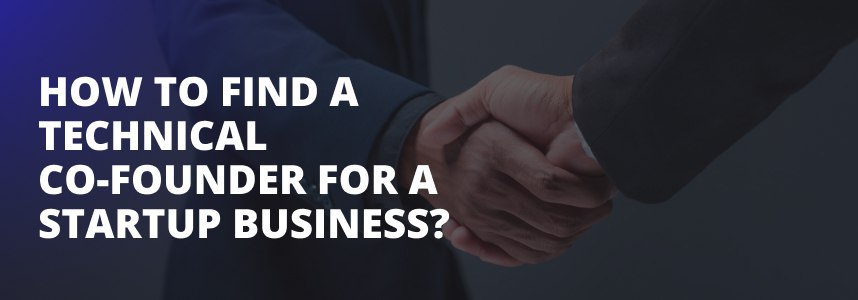Let’s work together to build something amazing. Share your project details and our team will reply to figure out the next steps to your success.

In the startup world, having a co-founder is considered one of the best decisions an entrepreneur can make. However, finding the right co-founder can be challenging, and co-founder conflict is one of the leading causes of startup failure. This is where co-founder matching programs come in, as they help entrepreneurs find partners with whom they share a vision, values, and trust. In this article, we will explore the rise of these programs, how they work, and their benefits.

The Rise of Co-Founder Matching Programs
Co-founder matching programs are a growing trend in the startup world. Major accelerators like Y Combinator and AngelPad have launched dedicated platforms to help entrepreneurs find co-founders, recognizing that startup success rates are higher when founders team up. According to research, startups with co-founders raise 30% more funding and have a higher chance of successful exits than solo founders.
Co-Founder Matching Programs
The origins of co-founder matching programs trace back to the early 2010s. As the startup ecosystem multiplied, aspiring entrepreneurs needed help finding partners with a shared vision and complementary skills. Accelerators and incubators started receiving more and more applications from solo founders, and they noticed these applicants were less likely to be accepted into their programs. They began experimenting with different ways to help entrepreneurs connect and form teams.
How Co-Founder Matching Programs Work
Y Combinator launched its co-founder matching platform in 2011. The goal was to enable accepted founders to find potential co-founders from the same batch. The matching process started with a co-founder dating event where people could speed date and pitch each other. The platform allowed people to create online profiles, indicate they were looking for a co-founder, and schedule calls or meetings with matches. This model was later adopted by other top accelerators and spread to dedicated co-founder matching platforms.
Many startups today have two or more founders. While the research is split on whether having a co-founder or being a solo founder contributes to the success of a business, co-founder conflict is listed as one of the leading causes of startup failure. Co-founder matching programs aim to address this by helping entrepreneurs find partners with whom they share vision, values, and trust – the foundation for a successful long-term partnership. While technology facilitates connections, finding the right match ultimately comes down to human chemistry.
Why Finding a Co-Founder is Well Worth the Effort
Having a co-founder is one of the best decisions an entrepreneur can make. Successful startups like Apple, Microsoft, and Google were all founded by teams of co-founders, not solo entrepreneurs. There are several benefits to having a co-founder:
Shared responsibilities
As a solo founder, you have to manage every aspect of the business, which can quickly lead to burnout. You can split responsibilities with co-founders based on your complementary skills and interests. One co-founder may focus on product, another on marketing, and another on finance. This division of labor allows each co-founder to focus on what they do best.
Complementary skills
Rarely does one person have all the skills needed to build a successful startup. Co-founders can have complementary technical, business, and soft skills that, as a team, can propel the business forward. For example, a technical co-founder, a business-savvy co-founder, a visionary co-founder, and an execution-focused co-founder. With the right match of skills, the whole becomes more significant than the sum of its parts.
Accountability
Co-founders provide accountability to push each other to achieve critical milestones and hold each other responsible for commitments. They can call out a lack of progress and help get each other back on track. As a solo founder, this kind of accountability takes a lot of work.
Emotional Support
Startups face many ups and downs, and entrepreneurship can be an emotional rollercoaster. Co-founders provide empathy, support, and encouragement to help each other through challenges, failures, and rejections. This emotional support can help strengthen resilience and perseverance.
Despite the research stating that co-founder conflict is a leading cause of startup failure, a co-founder partnership can be a crucial driver of success with the right match. The benefits of shared responsibilities, complementary skills, accountability, and emotional support are well worth the effort required to find the ideal co-founder. With open communication and a shared vision, co-founders can build a partnership that propels their startup to new heights.
What to Look for in a Co-Founder
Finding a co-founder with the right skills and experience is essential, but other qualities are equally critical to a startup’s success. Shared vision and values, work ethic, and personality compatibility are all factors that can make or break a co-founder relationship.
A Shared Vision
Look for a co-founder who shares your vision for the company and your passion for the problem you want to solve. A strong shared vision will motivate you both and help ensure you work toward the same goals. It’s also important to share similar values around work-life balance, company culture, and ethics. Differing values can lead to conflict down the road.
Solid Work Ethic
Work ethic and ability to execute are other must-haves. Look for a track record of follow-through and get things done. A hardworking co-founder with a growth mindset can learn and develop over time. A failure to pull its weight can drag the company down.
Complementary Working Styles
Consider how well your personalities and working styles mesh. Look for a co-founder with a complementary nature and skills different from your own. But you should also share similar emotional intelligence, flexibility, and ability to give and receive feedback. Strong communication and conflict resolution skills will help ensure any differences of opinion are handled constructively.
With so much at stake, take time to evaluate potential co-founders properly. Here are a few ideas to keep in mind:
- Work together on a trial project to see how you collaborate in practice.
- Check references from former colleagues and mentors.
- Discuss each other’s expectations for roles, responsibilities, time commitments, and equity splits before officially teaming up.
Finding the right co-founder is challenging, but you’ll build a partnership poised for startup success by looking beyond skills alone and determining the shared vision, values, work ethic, and personality fit.
How to Find Your Match
Finding a compatible co-founder is challenging, but several avenues are worth exploring.
Co-Founder Matching Platforms
Co-founder matching platforms like CoFoundersLab, FounderDating, and StartupNation offer dedicated marketplaces for entrepreneurs seeking co-founders. These platforms allow you to create a profile highlighting your skills, experience, and startup ideas. You can then browse profiles of potential matches, connect with exciting candidates, and schedule calls to determine if there is a fit. Many successful co-founder introductions have begun on these platforms, though it can take time to find an intense match.
Startup Accelerators and Incubators
Startup accelerators and incubators are also excellent places to find co-founders. Top accelerators like Y Combinator and Techstars receive thousands of applications from talented founders, and attending their events or demo days is an opportunity to network with potential co-founders with experience launching startups. Some accelerators also offer co-founder matching as part of their program. While highly competitive to get into, accelerators provide access to resources and advisors that can help ensure your co-founder relationship gets off to the right start.
Networking Events
In-person networking at startup events, meetups, hackathons, and conferences is also valuable for meeting potential co-founders. Speaking at or attending local startup community gatherings allows you to connect with like-minded entrepreneurs organically. Hackathons, where people come together to build new products or startup ideas over a short period, create an environment conducive to forming co-founder relationships. Several successful tech startups like GroupMe and Foursquare emerged from connections made at hackathons.
Online Communities
Online communities like Reddit’s r/cofounder forum, AngelList, and Facebook Groups focused on startups also provide a place to network virtually and vet potential co-founders. While less personal, these online communities expand your reach and allow for preliminary screening. The key is to move conversations offline as quickly as possible to assess partnership potential honestly. With time and persistence, the right co-founder can emerge from any of these channels. The key is actively networking, defining what you’re looking for in a partner, and settling once you find someone with the skills, vision, and shared values to build a successful business together.
4 Best Practices for Co-Founder Success
Finding the right co-founder is only the first step – building a successful long-term partnership requires work and commitment from both parties. According to experts, some of the best practices for co-founder success include:
1. Define Roles and Responsibilities Clearly
Establish who will focus on what areas and how you will make decisions together. This helps avoid confusion, power struggles, and dropping the ball on crucial duties. Put the agreement in writing to refer back to if needed.
2. Agree on Shared Values and Priorities Upfront
Discuss your vision, mission, and core principles for the business to ensure you have alignment. Come to a consensus on primary short and long-term goals. Revisit these discussions regularly as the startup evolves.
3. Establish Trust and Transparency
Share both good and bad news openly and honestly with your co-founder. Admit mistakes, discuss challenges, and ask for help when needed. Frequent communication and a “no secrets” policy help build a solid foundation of trust, essential for overcoming difficulties.
4. Commit to Resolving Conflicts Constructively
Disagreements and power struggles are inevitable in any partnership. Establish a process for navigating disputes in a collaborative, solution-focused way. Compromise when you can, and agree to mediate if needed. The startup should always come before egos.
Finding a co-founder can be a make-or-break decision for a startup. While the potential benefits of a co-founder partnership are huge, the challenges are equally significant. By following recommended best practices, maintaining open communication, and committing to the relationship and business, co-founders can build a successful, long-lasting partnership.
The Future of Co-Founder Matching
Co-founder matching programs are still relatively new but will likely become more sophisticated and effective. Advancements in AI, machine learning, and people analytics will enable higher-quality matches and more personalized recommendations.
Virtual “Speed Dating”
Platforms may start offering virtual co-founder “speed dating” and video chatting to help establish chemistry and compatibility. Algorithms can analyze factors like communication style, work habits, and problem-solving approaches to suggest co-founders that would work well together. Location-based matching may connect co-founders within the same city or region to facilitate in-person meetings.
Using Smart Contracts
Smart contracts and digital legal agreements could streamline the process of establishing equity splits, vesting schedules, and other financial details between new co-founders. Standardized templates would codify best practices to help avoid conflict later on. Partnerships could be provisional initially, with equity and commitments increasing over time as the relationship proves successful.
The Importance of Human Connection
While technology will introduce more efficiency and data-driven insights, finding the right co-founder always comes down to human connection. Co-founder relationships are deeply personal, built on trust, shared passion, and complementary skills. AI may help surface and evaluate more options, but people will still need to rely on their intuition and judgment to find a match that “feels” right.
Conflict Navigation Tools
Tools for navigating co-founder conflict and building healthy partnerships will also emerge. On-demand coaching, mediation, and counseling resources could help co-founders work through challenges together. The educational content on constructive communication, conflict resolution, and maintaining a shared vision over time will be essential.
The future of co-founder matching is bright, with technology and human support coming together to help more startups find their perfect match. While the process may become more high-tech, the end goal remains deeply human.
The right co-founder, with the right dynamic, can make all the difference in startup success. With data-driven platforms and brilliant partnership tools, more startups will find co-founders with whom they can go the distance.
Get the latest news and updates from Aleph One in your inbox.



